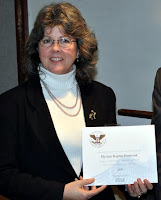Volunteer Highlight: Myriam Kaplan-Pasternak
Myriam Kaplan-Pasternak is a veterinarian, farmer, agricultural development practitioner and now CEO of Haiti Coffee. Since 1971, Myriam and her husband Mark have owned and managed Devil's Gulch Ranch in Nicasio, California, a diversified family farm that supplies high-end restaurants and wineries as well as educates children about nutrition and food production. Her experience in international development began in Niger, where she was a Peace Corps Volunteer from 1983-85 focusing on nutrition. Since 2007, Myriam has been working with Makouti Agro-Enterprise as a Partners of the Americas’ Farmer-to-Farmer volunteer. Throughout her 16 F2F assignments in Haiti, Dr. Kaplan-Pasternak has used her technical expertise to support the needs of impoverished communities in Haiti for which she received a Presidential Volunteer Service Award in 2010. Her efforts intensified following the January 2010 earthquake in Haiti, which she along with her husband and children experienced firsthand. She currently acts as a consultant, catalyst, and grant-writer for several agricultural projects throughout Haiti. She also helped found and direct several 501(c) 3 nonprofit organizations, including DG Educational Services and the West Coast Haiti Network.



While working with host Makouti
Agro-Enterprise, veteran F2F volunteer Myriam
Kaplan-Pasternak realized the potential for exporting high-quality Haitian
coffee to the international market. In July 2010, Dr. Kaplan-Pasternak recruited
Haitian-American businessman Yves Gourdet, to travel to Haiti as a F2F
volunteer in order to 1) assess coffee production in specific regions of country,
2) educate producers on the U.S specialty coffee market, as well as 3)
determine the feasibility of connecting Haitian producers to U.S markets. Based
on Gourdet’s findings, he and Dr. Kaplan-Pasternak developed a business plan
and launched Haiti Coffee Inc.

In the first year,
Haiti Coffee imported 11,000 pounds of coffee, ending the year with a small
profit, and was extended a line of credit from a private supporter. The next
year, Haiti coffee imported a full shipping container of coffee and expanded to
a second production site. Coffee bean sales have now impacted the lives of thousands
of farming families in Haiti, and the company has started reintroducing Haitian
coffee to the world. What is most significant about Haiti Coffee is not only
that is the result of cooperation between individuals and groups affiliated
with F2F, but also that it is working to build a sustainable network to support
viable, income-generating agricultural opportunities for Haitian farmers, and
moving up the value-chain to access larger markets.
In addition
to linking coffee producers to markets, Myriam, has been a key influence in the
launch and ongoing development of locally-driven producer associations in
Haiti. Among these cooperatives is the Association
des Travailleurs de Dondon (ATD), a thriving, young cooperative that is
leading the charge in their region’s resurgence. As they head into their fifth
harvest season, founding director Jacquelin Lucas takes time to reflect on
where they’ve been and where they are going:
It first starts with Myriam [Kaplan-Pasternak], a Farmer-to-Farmer
volunteer, who helped us see that it was not a waste of time to focus on
increasing the value of Haitian coffee. She’s been involved with many aspects
of our business, from seedling production to processing to cupping. There are
not enough words to describe Myriam’s influence on our effort and success.”
Myriam had been working with Jacquelin in his role as a field technician for Makouti and supported him in the creation of the cooperative. In the beginning, Jacquelin needed to educate the producers on quality standards for the international market. Thanks to F2F and volunteers like Myriam, he was able to teach other producers how to assess and meet quality standards at every step of the process. In addition to providing training and technical assistance, Myriam, through her role with Haiti Coffee, invested financially and emotionally in the success of the effort.
Today ATD is
successfully competing in the international market. They have a contract with
Haiti Coffee for the US market and are in negotiations with Vasco
International, a Chinese company and potential buyer. Part of what has led to
ATD’s rapid success has been the way they do business. They are singularly
focused on quality and quality improvement as a core operating value. They
apply a ‘quality lens’ at each point on the value chain and provide services to
help their producers. For example, when producers bring their cherries (green
beans) to sell, ATD does an initial sort on quality. They have visual tools to
help educate producers about standards. They’ll pay 40-50% upfront to help
bridge costs, and have other services such as de-pulping, drying and marketing,
in addition to this credit function. Within the past two years, ATD has gone
from 80,160 Haitian Gourdes ($1,781) in gross sales to 850,000 Haitian Gourdes
($13,077), and their coffee, is now consistently ranked 82 on the international
ranking system. Dramatic improvements in quality bode well for the future. On
the gender and environmental fronts, of its 200 members, 80 are women, and in
2015 their nursery had 14,000 seedlings of coffee and 5,000 seedlings of cacao.
When asked what has contributed
to ATD’s success, Jacquelin said it works like a family; everyone works
together. To be a member of ATD, there are rules that producers must agree to:
they must agree to be trained by the cooperative, and must live in the
community. Other values are reflected in their vision which focus on well-being
of community, environment and of course superior quality coffee. Since its
inception, ATD has been supported by seven F2F volunteers, each building on the
work and success of previous volunteers.




.png)

Comments
Post a Comment